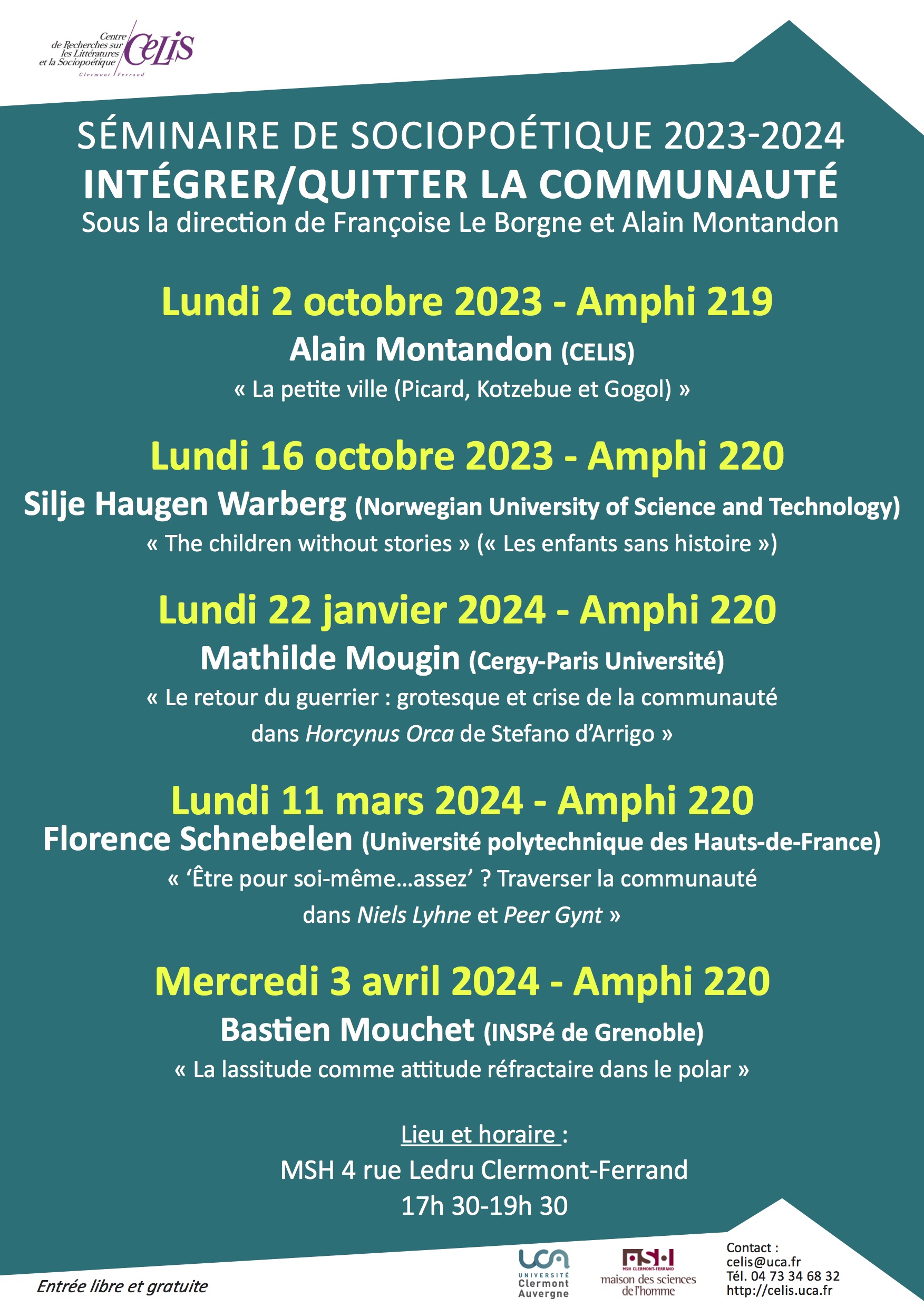Le 02 octobre 2023 De 17:30 à 19:30
Le 16 octobre 2023 De 17:30 à 19:30
Séminaire
Séminaire de sociopoétique
Publié le 8 septembre 2023 – Mis à jour le 11 janvier 2024

Lieu(x)
Maison de la vie étudiante / Campus des Cézeaux
Amphi 219 et Amphi 220
Amphi 219 et Amphi 220
Responsables scientifiques : Françoise Le Borgne et Alain Montandon
Programme : « Intégrer/quitter la communauté »
Lundi 2 octobre 2023 amphi 219
Alain Montandon (CELIS/IUF) :
« La petite ville (Picard, Kotzebue et Gogol) »
L’arrivée d’étrangers dans une petite ville de province est l’occasion de porter un regard critique sur le fonctionnement d’une communauté à travers des ressorts dramatiques aussi variés que plaisants. C’est ainsi que Picard publie sa comédie en 1801, tandis que Kotzebue publie la sienne en Allemagne une année plus tard. Ces deux hommes de théâtre furent des créateurs extrêmement prolifiques et célèbres en leur temps et ces deux comédies qui connurent un très vif succès par les caractères et les intrigues représentant un tableau moral et social très vivant des mœurs provinciales françaises et allemandes. Le thème lui-même inspira Gogol lors de la rédaction du Revizor.
Lundi 16 octobre 2023, Amphi 220
Silje Haugen Warberg (Norwegian University of Science and Technology)
« The children without stories » (« Les enfants sans histoire »)
My talk will explore questions of integration into and separation from communities through contemporary French and Norwegian texts, written from a parent or sibling perspective, about a family member with a neurodevelopmental disorder – mostly autism and/or intellectual disability – that leaves them with little or no language. In France, these works include philosopher Elisabeth de Fontenay’s Gaspard de la nuit (2018), author and director Matthieu Mével’s Un vagabond dans la langue (2020), and author and journalist Minh Tran Huy’s Un enfant sans histoire (2022), from which I borrow my title. These texts have in common that they build on personal experiences and that they combine life writing with meta-thematical reflections on literature, art, and language. A similar current can be observed in Norwegian contemporary literature, where Tordis Ørjasæter (2021) argues that authors writing about “The Different Child” now constitute a community in themselves, built around intertextual references and common themes, in which “we are not alone”. But who, in this context, are “we”?
A comparative view of these two national-literary trends can serve to highlight similarities and differences regarding both literary developments and cultural perceptions of neurodevelopmental disorders in France and Norway. What does these texts say about the ‘different child’s’ integration into or separation from communities such as the family or society (schools, work life, institutions)? And what kind of literary or textual communities do these authors write themselves into – and out of – when they set forth to write about ‘the children without stories’?
A comparative view of these two national-literary trends can serve to highlight similarities and differences regarding both literary developments and cultural perceptions of neurodevelopmental disorders in France and Norway. What does these texts say about the ‘different child’s’ integration into or separation from communities such as the family or society (schools, work life, institutions)? And what kind of literary or textual communities do these authors write themselves into – and out of – when they set forth to write about ‘the children without stories’?

